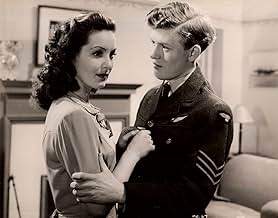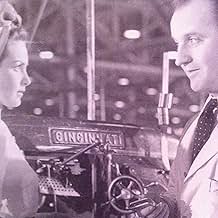Agrega una trama en tu idiomaA young woman called into service at a factory during World War II falls in love with a member of the RAF.A young woman called into service at a factory during World War II falls in love with a member of the RAF.A young woman called into service at a factory during World War II falls in love with a member of the RAF.
- Dirección
- Guionistas
- Elenco
- Mrs. Blythe
- (as Amy Vaness)
- Mrs. Hammond
- (sin créditos)
- Brenda - Worker at the Factory
- (sin créditos)
- Dirección
- Guionistas
- Todo el elenco y el equipo
- Producción, taquilla y más en IMDbPro
Opiniones destacadas
The theme is about the sacrifices made by the English during WWII, and the impact of the war on their lives. So many people ended up having their lives changes in ways that they didn't like, but the demand was to carry on. The story follows one family, and particularly the eldest daughter, who leaves home to work in a regional factory, meets and marries a young pilot.
Sounds trite? The film has a surprising balance of drama and war-time humour, and will be enjoyed by Beethoven fans. He should get a credit.
It is also unusual for the era in its unabashed portrayal of young women as actively sexual beings with a healthy, even predatory, interest in men. The sole - and glaring - exception to this model is the central heroine, Celia. Patricia Roc's portrayal of her is so overwhelmingly timid, self-effacing and prudish, it comes as little less than miraculous that she manages to bag Fred: a young Airman in the shape of Gordon Jackson. Mind you, he's no firebrand either: together, they make an infuriatingly ineffectual couple.
Far more interesting is the spiky relationship of social opposites Jennifer (Anne Crawford) - privileged/haughty/indolent - and no-nonsense factory foreman Charlie (Eric Portman). In this pair's uneasy mutual attraction and verbal sparring we see echoes of Shakespeare's Beatrice & Benedick.
N.B.: Watch out for a lovely cameo by Irene Handl as the newlyweds' landlady.
This movie is part love story and part propaganda-flic. The propaganda elements are more subtle than in many 40s films eg 'The Next of Kin'. However the life of the factory girl is glamourized. This is Celia's escape from the domestic drudgery of caring for her elderly father and allows her to find true love. Also the togetherness of the factory girls is emphasised throughout the film. The contrast between shots of Celia demure and alone that we see at the start of the film and the final scene of her as an integral part of the group is marked. Not only is munitions work vital to the war effort, we are being told, but it also provides companionship, an outlet and fulfillment for women.
A film about and for women in the workplace may sound like a step forward from the usual patriarchal portrayal of the female sex. Yet, at its heart this is a deeply conservative film. Ultimately Celia finds fulfillment with and through a man and whilst the companionship of women is important, all the female characters are searching for a husband.
However, the Directors should be applauded for having done a good job in making an enjoyable, informative propaganda film.
By the way, look out for the shots of Patricia Roc's feet when she is talking to her husband. Is this an erotic charge or fear of chilblains? Watch the movie and let us know what you think.
The cast is fine - Patricia Roc and Gordon Jackson headline as Celia and Fred, with Anne Crawford as Jenny and Eric Portman as down-to-earth foreman Charlie. There's also a bit for Radford and Wayne to do (an amusing scene where their travelling soldiers in a railway carriage get overrun with evacuees). Megs Jenkins also plays Gwen with some style and pathos. Patriotic hokum it may be, but I like the foregrounding it gives to the women (especially Jenny, who I quite like by the end of it) and the respect it gives to the factory girls and what they did for their country.
¿Sabías que…?
- TriviaGrandpa Jim comments that his daughter Phyllis has progressed from dating "local lads" to "the United Nations." Interestingly, although the international organization with that name did not exist until two years after the film's release, the term "United Nations' was used to describe the allied forces arrayed against the Axis Powers. FDR used the term frequently.
- ErroresAlthough Fred Blake (Gordon Jackson) is flight crew on a Short Stirling (the type of aircraft Celia makes parts for and which is seen being towed out of the factory), there are at least two shots of Fred's aircraft taking off/climbing which are actually an Avro Lancaster.
- Citas
Charlie: You can't cook or sew, I doubt if you can even knit. You know nothing about life, not what I call life. You're still only a moderate hand on a milling machine and if you had to fend for yourself in the midst of plenty you'd die of starvation. Those are only your bad points. I'm not saying you haven't got any good ones.
Jennifer: You're mighty generous Mr Forbes. As for you, you've no looks, you're old fashioned, morbidly suspicious, dull, and your pipe makes horrible bubbly noises.
- Créditos curiososOpening credits --- over archive footage: NOTE: The orange is a spherical pulpish fruit of reddish-yellow color.
- ConexionesFeatured in The Unforgettable Gordon Jackson (2012)
- Bandas sonorasSymphony No. 5 in C minor, Op. 67
(uncredited)
Music by Ludwig van Beethoven
Played over main titles and later in the score
Selecciones populares
- How long is Millions Like Us?Con tecnología de Alexa
Detalles
- Tiempo de ejecución1 hora 43 minutos
- Color
- Relación de aspecto
- 1.37 : 1
Contribuir a esta página



































